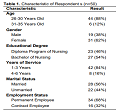Mind-body training and progressive muscle relaxation therapy on nurse with burnout syndrome

Downloads
Background: Nurse burnout could affect nurse's professional competence. Either physical or emotional burnout was related to an ineffective individual coping and emotional intelligence. The nurse burnout could be coped with a direct intervention on the individuals who practically focused on the mind and body system.
Purposes: This research was aimed to identify the effects of mind and body-based therapies (MBT and PMR) for nurse burnout.
Methods: This research was quasi-experimental with two groups pretest-posttest design. The sample of this study was 50 nurses in the medical-surgical wards who were divided into intervention MBT and PMR with a simple random sampling technique. Collecting data using burnout syndrome measurements on nurses applied pre and post-intervention, which was analyzed by Wilcoxon and Mann-Whitney test.
Results: The mean value of the burnout subscale decreased significantly (emotional exhaustion and depersonalization) and increased (personal accomplishment) after the MBT and PMR programs (p<0.05). The comparison of effect between the two intervention groups on nurse burnout syndrome found no significant positive difference in the mean scores (p>0.05).
Conclusions: Mind body-based therapies (MBT and PMR) could reduce burnout syndrome significantly.Authors retain copyright and grant the journal right of first publication with the work simultaneously licensed under a Creative Commons Attribution-NonCommercial 4.0 International License that allows others to share the work with an acknowledgement of the work's authorship and initial publication in this journal.
Authors are able to enter into separate, additional contractual arrangements for the non-exclusive distribution of the journal's published version of the work (e.g., post it to an institutional repository or publish it in a book), with an acknowledgement of its initial publication in this journal.
Authors are permitted and encouraged to post their work online (e.g., in institutional repositories or on their website) prior to and during the submission process, as it can lead to productive exchanges, as well as earlier and greater citation of published work (See The Effect of Open Access).

This work is licensed under a Creative Commons Attribution-NonCommercial 4.0 International License.











